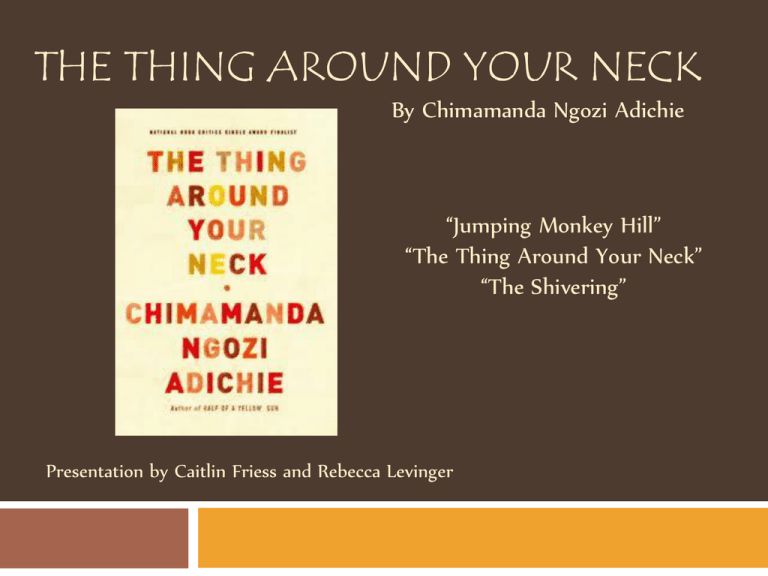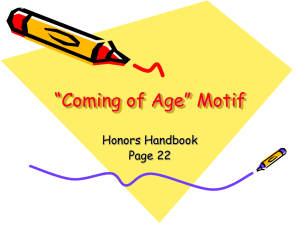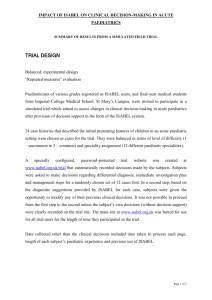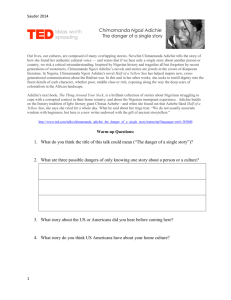The Thing Around Your Neck
advertisement

THE THING AROUND YOUR NECK By Chimamanda Ngozi Adichie “Jumping Monkey Hill” “The Thing Around Your Neck” “The Shivering” Presentation by Caitlin Friess and Rebecca Levinger Historical Context A former U.K. colony, Nigeria gained independence in 1914. It is a constitutional republic (an indirect democracy) Thomas Sankara (1949-1987) He was the president of Burkina Faso from 1983-1987. He was a Marxist revolutionary and a pan-African theorist. He is commonly referred to as “Africa’s Che Guevara” He was a Women’s Rights Activist. He was murdered by a former colleague. The plane crash from “The Shivering” is based on an actual crash. In October 2005, a passenger plane crashed killing 117 people. The first lady of Nigeria was having surgery in a hospital in Spain at the same time. She died in surgery, leading people to mistakenly believe she had died on the plane crash. Themes Leaving Being Female At the conclusion of each story, the protagonist walks away from someone or something. Many of the protagonist are oppressed or objectified because of the gender. Cultural Identity The protagonists struggle to reconcile traditional and western values “Jumping Monkey Hill” In this story, most of the characters are identified by citizenship rather than name. What does this explicit use of culture as an identifier say about interpersonal and/or intercultural relations? Is Ujunwa hypocritical for claiming that she does not believe in writing as therapy, then revealing her story is true? Is her story therapy? Why does Ujunwa continually lie to Isabel? What does it say about her as a character and how is the reader supposed to feel about it? Are we supposed to see Isabel as foolish? “Jumping Monkey Hill” “Ujunwa bought a necklace and put it on and liked the look of the white, toothshaped pendant against her throat. That evening, Isabel smiled when she saw it. “I wish people would see how faux-ivory looks real and leave the animals alone,” she said. Ujunwa beamed and said that it was in face real ivory and wondered whether to add that she had killed the elephant herself during a royal hunt. Isabel looked startled, then pained.” (113) How does this interaction make us feel about Ujunwa? About Isabel? Does it make a larger point about interracial or intercultural relations? “The Thing Around Your Neck” Why does Adichie choose to write this story in the second person? How is the reader meant to react to this? Is the reader supposed to see “become” Akunna? What is “the thing around your neck”- what does it signify to the protagonist and why is it the title? Why is this particular story the title story of the anthology? Does the reader’s sympathies lie with the protagonist or the love interest (or both or neither)? Have either of them actually wronged the other, or are they simply having a miscommunication because of cultural differences? Would it ever be possible for them to overcome these cultural differences? “The Thing Around Your Neck” “You thought everybody in America had a car and a gun; your uncles and aunts and cousins thought so, too. Right after you won the American visa lottery, they told you: In a month, you will have a big car. Soon, a big house. But don’t buy a gun like those Americans.” (115) Why does Adichie start the story with the protagonist’s misconceptions about America? “The thing that wrapped itself around your neck, that nearly choked you before you fell asleep, started to loosen, to go.” (125) Why does “the thing” loosen? “The Shivering” What is the symbolism of Ukamaka’s religious crisis and what does it say about her current identity crisis? Ukamaka spends much of the story defining herself by her exboyfriend. Can she overcome this? Chinedu defines her as a Nigerian- is this a better way for her to define herself? What is the significance of Ukamaka and Chinedu comparing their ex-boyfriends to Thomas Sankara? “The Shivering” “The choir had begun to sing. It was one of those Sundays when the preist blessed the congregation with Holy Water at the beginning of mass, and father Patrick was walking up and down, flicking water on the people with something that looked like a big salt shaker. Ukamaka watched him and though how much more subdued Catholic masses were in America; how in Nigeria it would have been a vibrant green branch from a mango tree that the preist would dip in a bucket of holy water held by a hurrying, sweating mass server; how he would have striden up and down, splashing and swirling, holy water raining down; how the people would have been drenched; and how, smiling and making the sign of the cross, they would have felt blessed.” (166) What is the implication of this? Do the people at the American mass not feel blessed?











